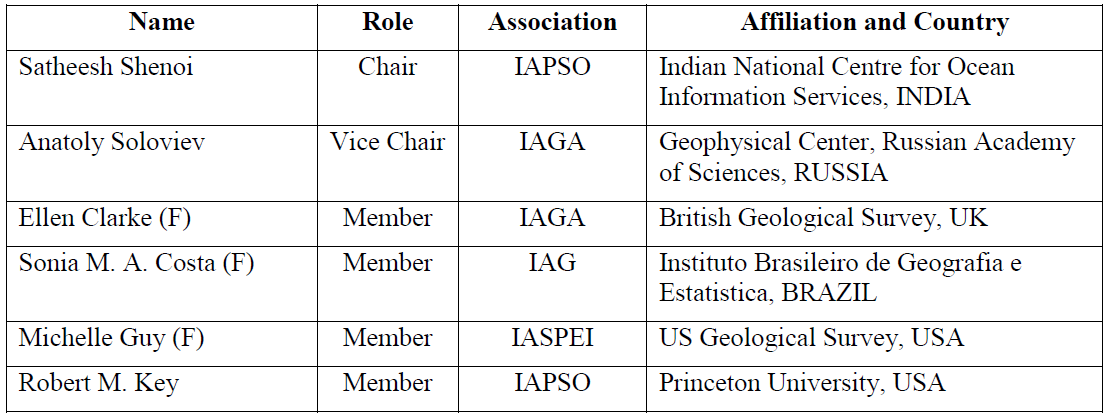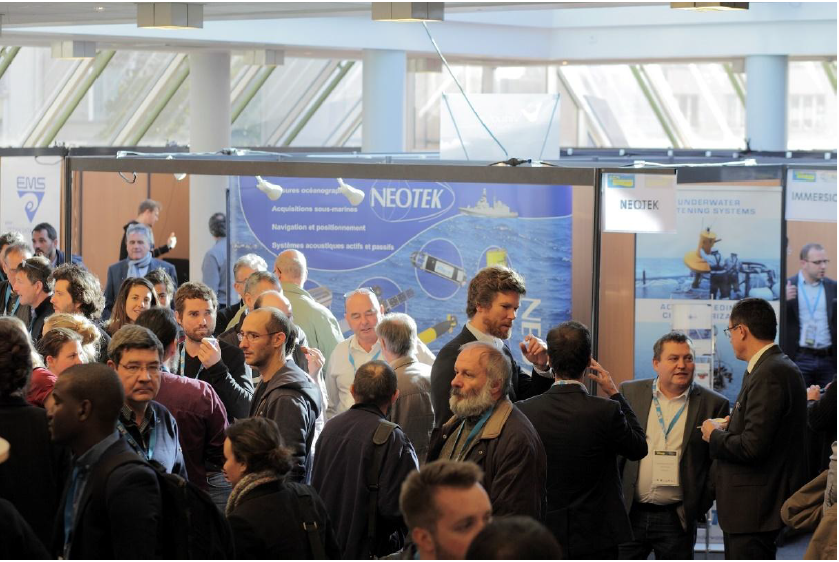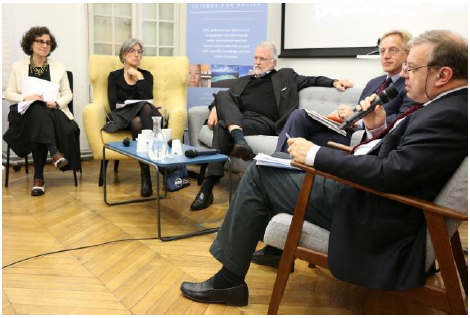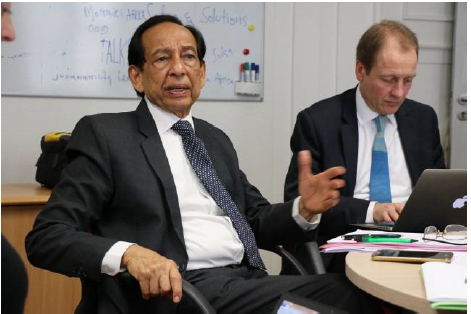The IUGG Electronic Journal Volume 17 No. 3 (1 March 2017)
INTERNATIONAL UNION OF GEODESY AND GEOPHYSICS
UNION GEODESIQUE ET GEOPHYSIQUE INTERNATIONALE
The IUGG Electronic Journal
Volume 17 No. 3 (1 March 2017)
This informal newsletter is intended to keep IUGG Member National Committees informed about the activities of the IUGG Associations, and actions of the IUGG Secretariat. Past issues are posted on the IUGG website (http://www.iugg.org/publications/ejournals/). Please forward this message to those who will benefit from the information. Your comments are welcome.
Contents
1. Union Commission for Data and Information renewed
2. Management of abstract, scientific program and travel grants for IUGG assemblies
3. Report on the Conference “A Connected Ocean”
4. News from the International Council for Science
5. First IUGG Symposium on Planetary Science
6. Call for Expressions of Interest to Host International Data Week 2018
7. Meeting calendar
1. Union Commission on Data and Information renewed
The Union Commission for Data and Information (UCDI) provides a focused and sustainable organizational structure supporting and strengthening IUGG science through integrated scientific information activities. As the Commission was inactive since the IUGG General Assembly in Prague in 2015, the IUGG Bureau decided to renew its membership in its mid-term, and the Executive Committee endorsed the decision. Union Associations nominated several candidates for the Commission, and the IUGG Bureau selected the final list of the members including Commissioners, who served for the previous term. The membership of UCDI for 2017-2019 is as follows:


(F is female, E is an early career scientist)
2. Management of abstract, scientific program and travel grants for IUGG assemblies
IUGG invites proposals to develop and maintain a web-based system for the abstract, scientific program and travel grant management for IUGG general assemblies (GAs). GAs are international in scope and usually attract between 4,000 and 5,000 participants, contributing to several hundred sessions with 5,000-6,000 oral and poster presentations. GAs usually last 10 days and grants are awarded to several hundred participants from less-affluent countries. Until 2015, GAs were organized by a local conference organizer, responsible for the full conference management. To implement and to standardize the abstract, scientific program and travel grant management of future GAs, the IUGG Executive Committee decided to appoint an Associate Professional Conference Organizer (APCO) based on invitation to tender from professional conference organizers. The APCO is expected to collaborate with multiple players including a Local Professional Conference Organizer and a Local Organizing Committee of the IUGG GA 2019. The APCO will oversee the meeting management in general and liaise with the Scientific Program Committee to decide about the scientific program and the travel grants. IUGG aims for a continued collaboration with the APCO after 2019. More information about the call can be found at: www.iugg.org/special/Call_ProgramAbstractGrant_Management_IUGG_GAs.docx
3. Report on the Conference “A Connected Ocean” (ACO2016)
The conference “A connected ocean: new approaches, new technologies, new challenges for knowledge of ocean processes” (ACO2016) was held in Brest, France, from 1 to 13 October 2016 and was the first opportunity to gather two scientific communities: the Ocean Engineering Society (OES) of the Institute of Electrical and Electronics Engineers (IEEE), and the IAPSO of IUGG. The sessions covered four themes: 1) Interoperability standards for the marine environment, 2) Multimodal synergies in ocean studies, 3) Big Data infrastructure and analytics in ocean science, 4) Biological rates, upwelling: new autonomous approaches and integrated observations. The conference started with a plenary, and hosted a special user engagement workshop co-organized with Eurogoos: “The power of open-access interoperable marine data for the maritime sector: An untapped resource?”
The “Big data” session gathered the largest crowd and was well attended by scientists and students. It was introduced by Stan Matwin, Chair of Excellence at the University of Dalhousie, Canada, who demonstrated the strength of machine learning solutions to tap into new sources of data, such as AIS (ship positioning) to fill gaps in satellite observations. A session covered the new synergies between the different sources of data now available to oceanographers of all disciplines: satellites, sensors, new radars, in-situ observations. The combined use of these data will lead to new discoveries (quoting one invitee, “the sky is the limit”). Successful applications of deep learning techniques were shown, for example in the case of sea surface temperature (SST). It was noted that for the reconstruction of small scale (sub-mesoscale) features in SST images, such as filaments and sharp fronts, the standard tools (natural images models) available on the web do not work well. Ocean dynamics should be considered to understand the information content of different variables (e.g., SST and sea surface height) and to find the best method to combine them into a coherent picture. Regarding in situ data, the pioneering ocean observatories in Canada are remarkable for the number of instruments in operation and the data flow produced. These data are now processed to create products, used by scientists but also other sectors of the society, for marine and public safety for example.

At the conference (photo: A.-M. Tréguier)
Other keywords of the conference were "interoperability and standards". While these concepts are well developed in the IEEE community, they are not often brought to the forefront and debated at IAPSO meetings. The development of standardization procedures is essential in many fields. Among the many related presentations, two examples are the “biodiversity information standard”, used to develop graph-based interactive databases of the ocean biodiversity; or the OGC (Open Geospatial Consortium) protocols that have been implemented by IFREMER (France) to facilitate access to its databases. Metadata must be further developed, as well as secure data communication protocols for deep sea observatories.
Discussions and round tables raised many more interesting issues, for example, the automation of data collection and multidisciplinary ocean observations. The objective of the organizers is to propose a series of dedicated "A Connected Ocean" workshops to tackle these issues. A special issue of the IEEE-OES journal is under consideration.
Anne-Marie Tréguier, a conference organizer
4. News from the International Council for Science
ICSU & ISSC strategy workshop on the future of science
An ICSU Perspective. The International Council for Science (ICSU) and the International Social Science Council (ISSC) hosted a high-level meeting of scientists and experts in Paris on 30 and 31 January 2017 to discuss the future of a proposed new organization that would result from a merger of the ISSC and ICSU. The workshop kicked off with a high-level panel discussion on “Setting the challenge: the future for global science.” The panel consisted of Craig Calhoun (President of the Berggruen Institute, Los Angeles, USA), Philip Campbell (Editor-in-Chief, Nature, London, UK), Robert Dijkgraaf (Director of the Institute for Advanced Study at Princeton, USA), Nada Al-Nashif (Assistant Director-General for Social and Human Sciences at UNESCO, Paris, France), Helga Nowotny (Professor Emerita of Social Studies of Science, ETH Zurich, Switzerland), and Flavia Schlegel (Assistant Director-General for Natural Sciences at UNESCO Paris, France). The workshop was moderated by Andy Martin, Firetail Company (London, UK). There were about 25 participants including officers of the two Councils. Harsh Gupta (IUGG Immediate Past President) was invited to attend the workshop.

Panelists (left to right): N. Al-Nashif, F. Schleger, C.
Calhoun, R. Dijkgraaf, and P. Campbell

H. Gupta during discussion (Photos: ICSU)
Major issues discussed were the future of science, and important priorities for a new council. It was mentioned that fundamental research remains critical in the work of the new council; inter- and trans-disciplinary co-productive research should become more focused bringing together natural and social scientists. However, bridging them is a great challenge, because of the existence of diverse incentives and methodological standards. The new council should construct new ways for cooperation, should avoid covering an expansive scientific terrain shallowly and concentrate its efforts on the promotion of more focused research. The new council would be well positioned to be engaged in monitoring of Sustainable Development Goals’ (SDGs) progress. There was debate around the importance of the UN’s Agenda 2030 on sustainable development as a “signature” program, as well as the challenge of tackling new topics such as artificial intelligence. Other important priorities could be scientific standards, ethics, and openness (particularly data openness). According to Thomas Rosswall (a former Executive Director of the ICSU), an advocacy role for the council is needed, “but it needs to demonstrate impact”. Participants saw a role for the new council in upholding the universality of science and freedom of scientific exchange (Source: ICSU website).
An IUGG Perspective. ICSU or a new body to come will face several challenges. First, the majority of active scientists do not know what ICSU or ISSC stands for and what the Councils are doing for science promotion. One of the major priorities of the new body should be high visibility in the world of scientists. This new Council should work for scientists via its scientific unions and national academies/research councils and for science policy via UN agencies. Second, scientists, especially early-career scientists, belong to their professional societies and participate in the activities of these societies. Usually, they are less interested in promoting international science. Third, presently, there are many international bodies1 and inter-governmental institutions2 dealing with various aspects of scientific and technological development. What would be the unique role of the new Council for science? Should it become a stronger voice for international science? These and many other challenges including those mentioned above should be carefully considered by the ICSU-ISSC Strategy Working Group, which intends to prepare the strategy document to become the official strategy for the new merged organization (Alik Ismail-Zadeh, IUGG Secretary General)
Trans-disciplinary Research for Improving Climate Studies and Understanding
The International Union of Biological Sciences (IUBS) and the International Union for Quaternary Sciences (INQUA) won one of three major grants of the International Council for Sciences (Euro 300,000 for 3 years) to promote trans-disciplinary research in climate studies entitled “TROP-ICSU: Trans-disciplinary Research Oriented Pedagogy for Improving Climate Studies and Understanding”. This project proposal was supported by a number of international organizations including IUGG. Educating forthcoming generations about the causes and effects of global climate change is imperative since implementing solutions depends on an informed public. Research efforts, mostly in the domains of planetary science, ecology and evolutionary biology along with mathematical tools of big data analysis, have been initiated the world over to identify key factors that affect the ecosystem functions and services. These efforts need to be scaled up substantially and rapidly, requiring a whole new generation of multidisciplinary scientists, policymakers, and administrators. The project intends to identify, through a consultative mechanism, most relevant curricula and efficient pedagogical tools, outreach and citizen science programs to study the impact of climate change on biodiversity and ecosystem functions and services and the ways to address these problems in the coming years. Keith Alverson (Japan), Secretary of the IUGG Commission for Climatic and Environmental Change (CCEC) will co-ordinate IUGG input for the project. Other project participants from IUGG are Tom Beer (Australia), Moira Doyle (Argentina), and László Szarka (Hungary).
ICSU grants were awarded also to the International Mathematical Union (IMU) and the International Union of Pure and Applied Chemistry (IUPAC) for the project “A Global Approach to the Gender Gap in Mathematical and Natural Sciences: How to Measure it? How to Reduce it?” and to the International Union of Pure and Applied Physics and the International Union of Crystallography for the project “Utilisation of Light Source and Crystallographic Sciences to Facilitate the Enhancement of Knowledge and Improve the Economic and Social Conditions in Targeted Regions of the World”. More information is available at: http://www.icsu.org/what-wedo/projects-activities/icsu-grants-programme/... (Source: ICSU website).
1Examples: the Council for International Organizations of Medical Sciences – CIOMS; the International Council for Philosophy and Human Sciences – CIPSH; the Global Network of Science Academies – IAP; the World Academy of Sciences – TWAS; the World Federation of Engineering Organizations – WFEO
2Examples: the Preparatory Commission for Comprehensive Nuclear-Test-Ban Treaty Organization – CTBTO; the Group on Earth Observations – GEO; the International Atomic Energy Agency – IAEA; the United Nations Educational, Scientific and Cultural Organization UNESCO; the World Health Organization – WHO; the World Meteorological Organization – WMO
5. First IUGG Symposium on Planetary Science

Planetary science is an interdisciplinary field across IUGG disciplines as well as geology, geochemistry, and astrobiology. The First IUGG Symposium on Planetary Science (IUGG-PS2017) “Interdisciplinary observation and understanding of the Solar System” will be held on 3-5 July 2017 in Berlin, Germany. The symposium aims to bring together international scientists and engineers focused on interdisciplinary work related to exploration and science of the solar system and seeking life beyond Earth. Topics include planetary geodesy, remote sensing, atmosphere, ionosphere/plasma physics, magnetic and gravity field, geomorphology, geophysics, geodynamics, geology, petrology, volcanology, geochemistry, interior physics, and life & astrobiology. More information will be available at http://www.dlr.de/iugg-ps2017. All of the IUGG community is welcome to attend the IUGG-PS2017.
Shuanggen Jin, Chair, IUGG Union Commission on Planetary Sciences
6. Call for Expressions of Interest to Host International Data Week 2018
The first International Data Week (IDW) was held in Denver, Colorado, USA in 2016 and organized by the ICSU Committee on Data for Science and Technology (CODATA), the ICSU World Data System (WDS), and Research Data Alliance (RDA). The event attracted more than 850 data scientists, researchers, industry leaders, entrepreneurs, policymakers, and data stewards from all disciplines and from across the globe to explore how best to exploit the data revolution to improve science and society through data-driven discovery and innovation.
Building on the success of the IDW, CODATA, WDS, and RDA plan to hold a second International Data Week in September or October 2018, and are requesting Expressions of Interest by 10 March 2017 to host the second edition of this exciting event. For more information, please visit the website http://internationaldataweek.org/idw2018 or download the PDF file https://www.icsu-wds.org/files/CallforExpressionofInteresttoHostInternationalDataWeek2018.pdf.
Mustapha Mokrane, Executive Director, WDS
7. Meeting calendar
A calendar of meetings of interest to IUGG disciplines (especially those organized by IUGG Associations) is posted on the IUGG website (http://www.iugg.org/calendar.php). Individual Associations also list more meetings on their websites according to their disciplines.
March
- 14-16, ICTP, IUGG, Antigua, Guatemala, Conference on the Science of Climate Change: a focus on Central America and the Caribbean Islands. Web: http://indico.ictp.it/event/7949/
- 27-30, German Geophysical Society (DGG), GFZ, Potsdam, Germany, DGG Annual Meeting. Web: http://dgg2017.dgg-tagung.de/start/
April
- 3-7, IAG, ISPRS, Rosario, Argentina, 1st International Symposium – Applied Geomatics and Geospatial Solutions. Web: http://www.geodata2017.com.ar/index.php/en
- 18-21, IAHS, UNESCO, New Delhi, India, International Conference on the Status and Future of the World's Large Rivers. Web: http://worldslargerivers.boku.ac.at/wlr/
- 23-25, IGU, La Paz, Bolivia, Geographies for Peace 2017. Web: http://iguonline.org/geographies-for-peace-geografias-para-la-paz-igu-ugi-thematic-conference-23-25-april-2017/
- 23-28, EGU, Vienna, Austria, European Geosciences Union General Assembly 2017. Web:http://www.egu2017.eu/
May
- 17-19, IAG, Wroclaw, Poland, EUREF 2017 Symposium. Web: http://www.igig.up.wroc.pl/euref2017
- 20-25, JpGU, AGU, Makuhari, Japan, JpGU-AGU Joint Meeting 2017. Web: http://www.jpgu.org/meeting_e2017/
- 22-26, UNISDR, Cancun, Mexico, 2017 Global Platform for Disaster Risk Reduction. Web:
http://www.unisdr.org/conferences/2017/globalplatform/en
- 22 May – 2 June, ICTP, IUGG, Trieste, Italy, Extended Workshop on Space Weather Effectson GNSS Operations. Web: http://indico.ictp.it/event/7964/
- 29 May – 2 June, ILC, Ljubljana, Slovenia, The Fourth World Landslides Forum 2017. Web: https://www.wlf4.org/
IUGG Electronic Journal Volume 17 Number 3 (1 March 2017)
Editors: Tom Beer, Alik Ismail-Zadeh (Editor-in-Chief), Franz Kuglitsch (Associate Editor), and Kathryn Whaler.
If you no longer wish to receive the IUGG Electronic Journal, please send an email to the IUGG Secretariat (secretariat@iugg.org).


